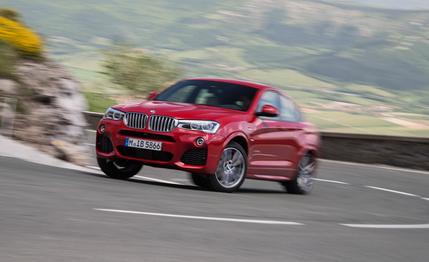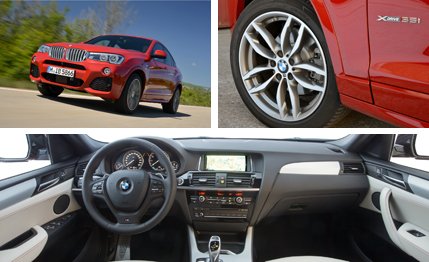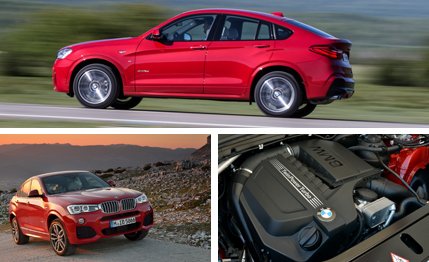
 First Drive Review
First Drive Review
The first SUV/coupe was a success—just ask its Bavarian creators. The BMW X6 was “an awesome statement of beauty and power,” according to former chief designer Chris Bangle, and roughly a quarter-million people around the globe have agreed. That was encouraging enough for BMW to apply the formula to a lower segment in the form of the new X4.
This launch coincides with the mid-term face lift of the X3 on which it’s based—the tardiness is because the X4 wasn’t approved until the current X3 was almost through development—and the two models share hoods and headlamps. The X4’s front fascia is unique, however, and it’s probably sufficiently differentiated overall for most customers, considering the rest of the exterior is unique aft of the A-pillars. The X4 features a coupelike sloping roofline that ends in a small tail. The look will be aped by the next-gen X6, which is due to be launched later this year. BMW is proud of the pronounced rear shoulder, a major element that will define the brand’s X “coupes.”


Inside, there is little differentiation between the X3 and X4, with the dashboard and trim being the most noticeable common bits. The M Sport and xLine packages bring more color to a fairly somber cabin, if that’s your thing. The lowered roofline doesn’t cut into interior space as much as you might expect, and the cargo hold can swallow between 17.7 (rear seats raised) and 49.4 cubic feet (rear seats down) of fine cheeses and designer handbags. Compared with the X3, the front passengers sit lower by 0.8 inch and the rear passengers by 1.1 inches. That difference means the command seating position preferred by crossover buyers is slightly less commanding, but X4 drivers nevertheless remain perched above the riffraff.
But lowering the occupants—and therefore the center of gravity—does help vehicle dynamics, and the X4 displays superb body control during hard cornering. It makes sense, and we don't have many complaints about the handling of the X3, which won a three-way comparo last year. The X3 and the X4 have essentially identical chassis, and the X4’s all-wheel-drive system thus works seamlessly as it shuttles torque between the wheels. BMW continues evolving its electromechanical power-steering system, and this is one of its best yet, offering good accuracy and progressive weighting as cornering loads increase. We’re not sure you necessarily need to go stiffer with the suspension—what, are you gonna hit the Ring?—but for buyers unsatisfied with a perfectly satisfactory ride-and-handling balance, the M Sport trim firms things up. A proposed M Performance model would go even further.


Fitted with the top-spec turbocharged 3.0-liter inline-six, the X4 xDrive35i feels plenty quick. It whips up a rated 300 horsepower from 5800 to 6400 rpm and 300 lb-ft of torque from 1200 to 5000, and we figure the xDrive35i is capable of charging to 60 mph in about 5.4 seconds. Top speed is governed at 130 mph. The familiar hum of a straight-six sets this model apart from the entry-level xDrive28i, which comes with a 240-hp, 2.0-liter turbocharged four. But even that model should be quick, with 60 coming up in an estimated 5.9 seconds. Both models make use of the ubiquitous and transparent ZF 8HP eight-speed automatic, and all-wheel drive is standard. (That’s what the xDrive portion of BMW’s ridiculous names means.)
The X4 xDrive28i starts at $45,625, and the xDrive35i comes in at $48,925. Those prices are each a few grand more than the cost of a commensurate X3. For buyers who don’t need the X3’s extra room, the X4 presents an interesting alternative. If they don’t mind paying more for less, that is.